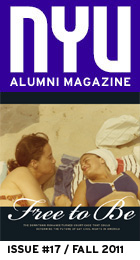student outreach
Small Businesses,
Big Ideas
A Stern program turns students into key consultants
by Sally Lauckner / GSAS ’10
Last February, Yoel Borgenicht filled out an application that forever changed the way he does business. Borgenicht, the president of King Rose of New York, a Harlem-based construction company that focuses on high-end renovations, aspired to expand the revenue and staffing of his two-and-a-half-year-old business, but was at a loss on how to do so. “I felt like my experience and abilities had taken the business as far as it could go, but I wanted to exponentially increase the size of the firm,” he says. “I knew I needed guidance.”It turns out a group of graduate students could help with the solution. Established in 2002, the Stern Consulting Corps, or SCC, matches qualified grad students from the Leonard N. Stern School of Business with non-profits where they consult with small businesses in underserved New York City communities. After a grueling application process, which includes several rounds of interviews, accepted students are given the opportunity to work with prominent organizations such as the Metropolitan Opera, Habitat for Humanity, the Legal Aid Society, or the William J. Clinton Foundation. Borgenicht applied through the Clinton Foundation and was matched with a group of three MBA students and their mentors from Booz & Company, a consulting firm.
Working with King Rose construction was a natural fit for Raha Nasseri (STERN ’12), who previously served with Engineers Without Borders in Peru and as a civil engineer for a construction company in her native Iran. “I wanted to get a clear snapshot of the entire consulting process,” Nasseri says, explaining what has attracted some 500 Stern students to participate in the program. “I wanted to learn how to solve problems and how to present projects to clients.”
After an arduous 10-week process of conducting market research on similarly sized companies and holding a series of meetings with Borgenicht and other King Rose employees, the students and consultants determined that a key step was for Borgenicht to hire middle-management people to handle day-to-day responsibilities, allowing him to devote more time to financial tracking. The team determined the specific skills the new hires would need to possess and calculated how much it would cost the company. The students’ fresh vantage point to such businesses is essential, says Julius Tintelnot, program associate for the Clinton Foundation. “It is very valuable for the owners to have an outsider come in and question them,” Tintelnot says. “They become more business-savvy because they take a step back and evaluate how they run their business.”
For Borgenicht, the process delivered both a valuable learning experience and a boost in business. “I’d never worked with consultants before, so my expectations weren’t concrete, but they figured out what the company was about and helped me determine the road map for growth,” he says. In fact, Borgenicht reports that his company’s staffing is up to 45 employees (from 33) and that his profits have also increased, something he owes partially to the Stern students. He also had such a positive experience working with Nasseri that after the final presentation, he offered to hire her as a consultant. She had to decline as she’d already committed to a summer internship but found the experience invaluable nonetheless. “I didn’t sleep very much and I worked on weekends, but it was eye-opening,” she says. “I learned that consultants not only have to be business-savvy, but they have to develop a vision for a company and be able to express that.”
Company President Yoel Borgenicht had such a positive experience working with one student that after the final presentation, he offered to hire her.







